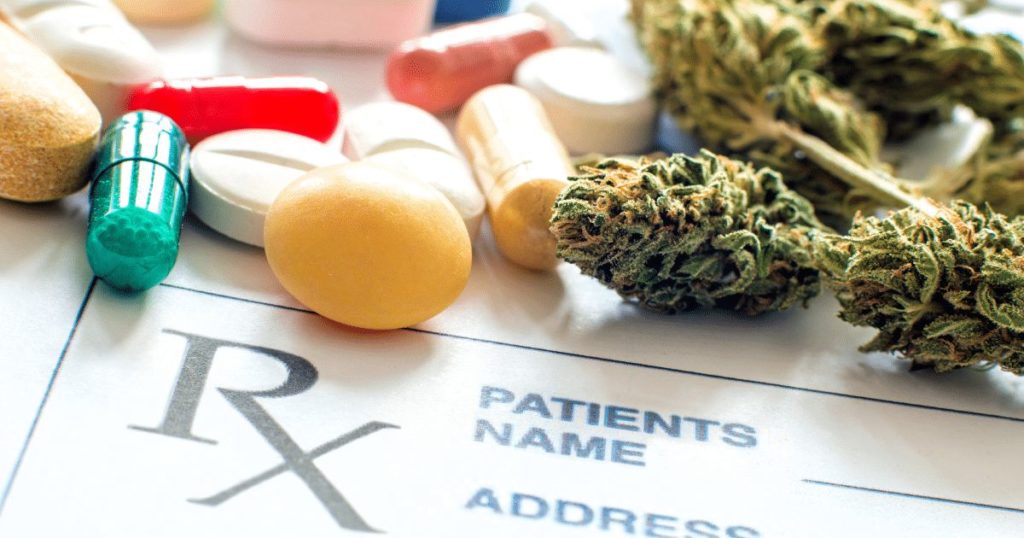Breaking news! Marijuana can help alleviate symptoms of anxiety, sleep, chronic pain, and seizures.
The cannabis community has known for years about the multiple benefits that cannabis can provide; CBD has been used for decades to treat many issues, with resounding success. However, it’s only recently that the scientific community has joined the movement and begun conducting mainstream research on the subject.
A new study published in the journal Health Economics is shedding light on the impact legalization is having on drug prescriptions. Here are the main points of the study and what it means for Americans.
Reduction In Prescription Drug Use
While several earlier studies have found links between state-level medical cannabis legalization and lower pharmaceutical prescriptions, this recent study focuses on the potential impact of recreational legalization in 10 states plus Washington, D.C.
Researchers used data from Medicaid reporting on prescription drugs from 2011 to 2019 to determine whether there is a statistically significant relationship between giving adults legal access to regulated marijuana and the use of pharmaceuticals for six different conditions, using two-way fixed effects event study models. Spoiler alert: the connection between the two was clear.
States that have legalized cannabis for adult use have “substantial reductions in the volume of prescriptions within the pharmacological classes that correlate with the medical indications for pain, melancholy, anxiety, sleep, psychosis, and seizures.”
According to the researchers, the findings “indicate replacement away from prescription medications and possible cost savings for state Medicaid programs.”
Who Could Benefit?
The results of the study are promising for those currently using prescription medications for anxiety, depression, pain, and more. The numbers don’t lie–significant numbers of patients were able to replace their meds with cannabis use:
- depression (-11 percent)
- anxiety (-12 percent)
- chronic pain (-8 percent)
- seizures (-10 percent)
- psychosis (-11 percent)
- sleep (-11 percent)
Unfortunately, while cannabis is often suggested as a way to treat glaucoma, spasticity, and nausea, the study found no “measurable changes” in prescribing it for those medical issues.
New Opportunities
As opioid addiction soars across the country, these findings open up promising new potential for treating medical problems that are typically countered with prescription drugs. The report states that ”The findings suggest a possible harm reduction opportunity, as prescription medications frequently have hazardous side effects or, as with opioids, the potential for misuse.”
Policymakers across the nation should use these findings as a lesson: “cannabis legislation appears to affect consumer behavior while we still do not have a grasp on what a medicinal ‘dosage’ of cannabis truly is”, according to Shyam Raman, a Cornell University researcher who co-authored the paper.
[RELATED READING: Costs of Lifesaving Drugs Rising Faster than Inflation, Americans are More Likely to Die from an Opioid Overdose than a Car Crash …and Cannabis is Still Illegal]
More Federal Research Needed
While some research has been done in the past, this study makes it clear that more federal studies are needed to explore cannabis as an alternative to opioid use.
“The first step toward evaluating cannabis for (opioid) harm reduction is knowing what that therapeutic dose looks like, and that requires federal funding to be made more widely available to address those questions,” Raman explained in an email.
Medical marijuana legalization is great, but broader adult-use legalization is better. While previous research has indicated that medical cannabis legalization alone appears to correlate with lower utilization of certain prescription drugs, “it’s fair to say that this [new paper] shows the scope of potential substitution is broader with [adult-use legalization],” when compared to medical marijuana alone.
According to the research, this development is linked to “the broader access offered by [recreational cannabis regulations],” as such programs do not require medical diagnoses or physician recommendations.
The effectiveness of cannabis use as an alternative treatment for anxiety, seizures, pain, and other medical issues has been common knowledge for years. Unfortunately, the lack of proper research and recognized studies like this most recent report are the reason it’s not more well known. Increased federal research is needed and would open the doors to more opportunities for cannabis as a legitimate (and safer) way to treat these issues…while reducing opioid dependency across the country.
Enjoyed that first hit? Come chill with us every week at the Friday Sesh for a freshly packed bowl of the week’s best cannabis news!


















